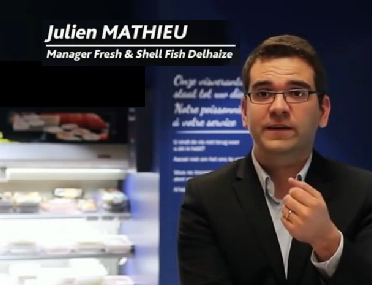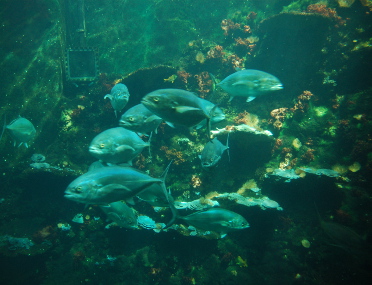Press releases
Fisheries

EU and Faroe Islands: "Our herring dispute is over"
29/08/2014
PHOTOS - A week after the EU lifted its trade measures against the Faroe Islands on herring and mackerel, Commissioner Damanaki received the Minister of Fisheries of the Faroe Islands, Mr Jacob Vestergaard, in Athens.
At a press point held after their meeting, Commissioner Damanaki made clear that “the herring dispute is over” which was “good news for all sides”. She stated that she agreed with the Minister that sustainable fisheries in the North-East Atlantic was a “common objective” of both sides.
Future catch limits would have to be agreed among all five coastal states involved in this fishery in the North-East Atlantic. Read her full statement:
"Ladies and Gentlemen,
Thanks for being with us today. I very much welcome Minister Vestergaard here in Athens.
We discussed a challenge that we are facing in all European sea basins, be it here in the Mediterranean region or in the North East Atlantic: we need to get back to healthy fish stocks in Europe. Whereas the situation in the Mediterranean is alarming, with more than 90% of the stocks overfished, a lot of work also needs to be done in the Atlantic where fish stocks are slowly recovering.
Until recently the EU and the Faroe Islands had disagreements about the sustainable management of mackerel, Atlanto Scandian herring and blue whiting in the North East Atlantic. But the Faroe Islands agreed this summer to end their unsustainable fishery. So I am very happy to say that the EU last week lifted its trade measures that were imposed in reaction to the unsustainably high catch limits.
In today's discussions, Minister Vestergaard and I were in full agreement on three things:
First, we agreed that the herring dispute between the EU and the Faroe Islands is over. Faroese fishermen are back in EU waters and European fishermen have taken up their traditional fisheries in Faroese waters. This is good news for all sides.
Second, we agreed that we had a common objective: sustainable fisheries in the North-East Atlantic. If we want to continue fishing in these waters, we need to stick to the advice of our scientists on the state of the fish stocks.
Third, we agreed that we needed to work hand in hand to reach this objective. We need to agree among all five coastal states in the North East Atlantic on our quotas: the European Union, the Faroe Islands, Iceland, Norway and Russia. And the resolution of the bilateral dispute between the EU and the Faroe Islands is without prejudice to the outcome of our upcoming talks about the 2015 catch limits this autumn.
I look forward to a strategic partnership that the EU and the Faroe Islands could develop with these three points in mind.
Thank you."
Find here the EU – Faroese Joint Statement following today's meeting.
For background information: http://europa.eu/rapid/press-release_IP-14-931_en.htm ; http://europa.eu/rapid/press-release_IP-14-668_en.htm

Story of the week: "The importance of our local food cultures"
25/08/2014
This week's story about sustainability will look at the work of the Slow Food movement, a global, grassroots organisation with supporters from 150 countries, that counters the rise of fast food by raising awareness on the importance of our local food cultures, linking the pleasure of good food with a commitment to local communities and the environment.
Read below the testimonial of Carlo Petrini, President and Founder of the Slow food movement:

Story of the week: example of sustainable aquaculture in Croatia
19/08/2014
This week's story about sustainability will take through the work of Cromaris, a company producing and marketing top quality fish and seafood in Croatia. Producing sea bass, sea bream and other white fish species like meagre and dentex, as well as oysters and mussels. With a production of around 5,000 tons, Cromaris is approximately the 10th biggest supplier of farmed white fish in the Mediterranean.
Read below the testimonial of Goran Markulin, General manager of CROMARIS:

Herring dispute: EU lifts measures against the Faroe Islands
18/08/2014
The Commission has today repealed the measures adopted against the Faroe Islands in August 2013 following their unsustainable fishery on Atlanto-Scandian herring. The measures imposed at the time will now be lifted as of 20th August 2014.
The decision comes after it was agreed that the Faroe Islands would cease their unsustainable fishery and would adopt a catch limit for herring in 2014 at 40,000t. This level is considerably lower than the one the Faroes had adopted in 2013 and which, according to the current scientific assessments, does not put in jeopardy the conservation efforts of the coastal States sharing the stock.
However, the lifting of the measures does not represent a tacit agreement by the EU that 40,000t is the legitimate share of the stock for the Faroe Islands. It is merely indicative of the fact that the sustainability of the stock is no longer in jeopardy. The decision is also without prejudice to the consultations that will take place in the autumn among the five coastal States (Norway, the Russian Federation, Iceland, Faroe Islands and the EU) on the future sharing of the stock.
The lifting of the measures represents a clean slate in the EU's relations with the Faroe Islands, a country viewed as a potential strategic partner on pelagic fisheries in the north-east Atlantic. Commissioner Damanaki intends to meet Mr Vestergaard, Minister of Fisheries of the Faroe Islands, to set the basis for a new era of cooperation.

Story of the week: "The commitment of the retail industry to offer sustainable fish and seafood to consumers"
12/08/2014
This week's sustainable story will drive you through the commitments of Belgian retailer Delhaize to ensure consumers find sutainably fished fish and seafood in their supermarkets.
Read below the testmonial of Julien Mahieu, Delhaize Belgium's Seafood Manager:
"For me, fish and marine life is a virus I’ve had for as long as I remember. I’m a hobby fisher and diver; although not good at either of the two I’m afraid. Through my bio-engineering degree I’ve also had to chance to study a bit of marine biology and aquaculture. Yet beyond discovering the richness of those eco-systems, my interest goes to how those resources can be managed in an efficient way: for me a good plan has to rationally combine both sustainability and profitability. Now add a genuine passion for ‘just eating’ the products and communicating this fervour to other consumers, and you have a pretty obvious track to my position in a quality food company such as Delhaize!

Fight against overfishing: European Commission announces deductions from 2014 fishing quotas
11/08/2014
The ten Member States that declared having exceeded their fishing quotas in 2013 will face reduced fishing quotas for those stocks in 2014. The European Commission announces these deductions on a yearly basis to immediately address the damage done to the stocks overfished in the previous year and ensure a sustainable use by Member States of common fishery resources. Compared to last year, the number of deductions made went down by 22%.
Commissioner Damanaki said on this occasion: "If we want to be serious in our fight against overfishing, we need to apply our rules by the book – and this includes the respect of quotas. I'm glad to see that we did a better job in 2013 than in previous years when it comes to staying within quotas. That said, to achieve healthy fish stocks across Europe we also need efficient controls to enforce the rules in place."

Story of the week: "Fisch vom Kutter – From the fishing boat directly to the consumer"
04/08/2014
This week's story on sustainability is about an Innovative project from the Kiel bay area of Germany.
Fisch vom Kutter in the bay of Kiel, Germany, is an organisation that sells directly to customers from their fishing vessels as they arrive in the port. The idea came about from falling fish prices, and a desire to reenergise the local fishing community, which had dropped from 3 000 active fishers at its peak, to the current level of 59 small scale fishers. Their ingenious method of selling involves sending a simple text message to their website, whilst they are at sea, informing customers of their daily catch. Customers can then meet the vessels at the port and buy their fish directly from the fisher, improving prices, freshness and quality.
The project has at its core six main aims:
- making coastal locations more attractive for local people and tourists,
- highlighting the cultural and historical significance of fishing in the region,
- making buying fish an experience for the consumer through direct sales from the vessel,
- building relationships between fishers, fish restaurants and tourism specialists,
- integrating ports into the tourist industry as thriving places to visit and experience local history,
- improve regionalisation, whilst lowering CO2 emissions through changing the methods of refrigeration.
You can find out more on their project in this video and on Fisch vom Kutter's website.


